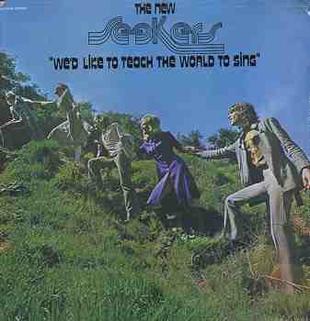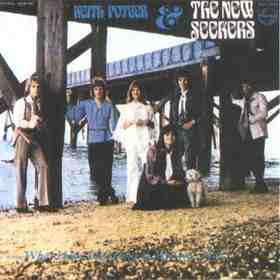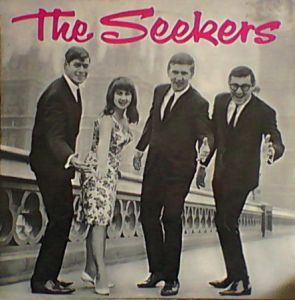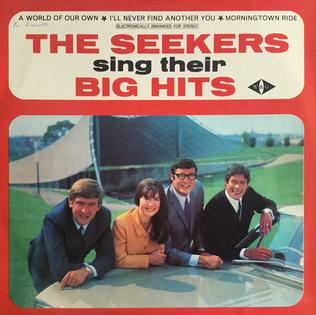
The Seekers were an Australian folk-influenced pop group originally formed in Melbourne in 1962. They were the first Australian pop music group to achieve major chart and sales success in the United Kingdom and the United States. They were especially popular during the 1960s, with their best-known configuration of Judith Durham on vocals, piano and tambourine; Athol Guy on double bass and vocals; Keith Potger on twelve-string guitar, banjo and vocals; and Bruce Woodley on guitar, mandolin, banjo and vocals.

The New Seekers were a British pop group, formed in London in 1969 by Keith Potger after the break-up of his group, The Seekers. The idea was that the New Seekers would appeal to the same market as the original Seekers, but their music would have pop as well as folk influences. They achieved worldwide success in the early 1970s with hits including "I'd Like to Teach the World to Sing", "You Won't Find Another Fool Like Me" and "Beg, Steal or Borrow."
Marty Kristian is a German-born, British-based musician. He grew up, and started his musical career, in Australia, as a solo artist. He is a singer-song writer-guitarist and, in the 1970s, he became a heartthrob as a founding member of the New Seekers.

Bruce William Woodley is an Australian singer-songwriter and musician. He was a founding member of the successful folk-pop group the Seekers, and co-composer of the songs "I Am Australian," "Red Rubber Ball," and Simon & Garfunkel's "Cloudy."

Keith Leon Potger is an Australian musician. He is a founding member of the Australian folk-pop group the Seekers. He was born in Ceylon and is of Burgher descent. In 1969, Potger and his business partner David Joseph co-founded the contemporary English pop group the New Seekers. Potger also records and performs as a solo artist.

Prima Donna were the United Kingdom representatives in the Eurovision Song Contest 1980. The group comprised sisters Kate and Jane Robbins, Sally Ann Triplett, Danny Finn, Alan Coates and Lance Aston. Finn was a former member of The New Seekers and was married to fellow ex-New Seeker Eve Graham. Robbins later embarked on a successful career as a comedian, impressionist and actress.
Brian Davison, was a British musician. He is best known for playing drums with The Mark Leeman Five, The Nice, Brian Davison's Every Which Way, Refugee and Gong.

Paul Martin Layton is an English musician and former child actor. He is the bassist and vocalist of the group The New Seekers.
The Deep Purple European Tour was a year-long successful concert tour by English hard rock band Deep Purple, lasting from July 1969 until June 1970. The band played mostly United Kingdom shows, also covering West Germany, Switzerland, Denmark, the Netherlands and Belgium. It was the first tour to feature the classic Deep Purple line-up: Ian Gillan, Roger Glover, Ritchie Blackmore, Jon Lord and Ian Paice. It is considered to be the pre-tour for the In Rock album, as the band mostly played songs from the upcoming album.

We'd Like to Teach the World to Sing is the name given to two albums by UK pop group The New Seekers. The first of these, released in late 1971, was a repackaging of their previous album New Colours and was released in the US. The second version of the album was released in the UK and Europe in 1972 with a new line-up of tracks. Both albums however contained the song "I'd Like to Teach the World to Sing ".

Beautiful People is a 1971 album by UK pop group The New Seekers. This was the group's third album and their last one released in the UK on the Philips record label. It was their first to be solely produced by David Mackay, who would guide the group through their most successful period over the next two years.

Keith Potger and the New Seekers is a 1970 album by the UK-based pop group The New Seekers. It was the group's second album and their only one to feature the group's founder Keith Potger as a member.

Now is a 1973 album by British pop group the New Seekers. It was retitled Pinball Wizards in the US.

Together is a 1974 album by British group The New Seekers. It features the No. 1 single "You Won't Find Another Fool Like Me" and the top five follow-up "I Get a Little Sentimental Over You". It was the last album the group released before a much-publicised split.

Farewell Album is the final album released by The New Seekers in their early 1970s hit-making line up, released in 1974. It is also the group's last release on Polydor Records.

Seekers Seen in Green is the sixth studio album by the Australian group The Seekers. It was released in the UK and Europe in 1967 by Columbia Records and EMI Records. It was released in Canada in 1967 and in the US in 1968 by Capitol Records. It was also released in Germany and the Netherlands on LP on the Emidisc‡ label in 1976. It was released on CD in 1999 in the UK.

25 Year Reunion Celebration is a live album credited to Judith Durham and The Seekers. It celebrates the 25th anniversary of the band's final performance in 1968. The concert was recorded at the Melbourne Concert Hall and released on 29 November 1993 and peaked at number 9 on the ARIA Charts in January 1994. The success lead to a sell-out UK tour across 1994 and 1995 at London's 'Royal Albert Hall' and 'Wembley Arena'.

The Seekers is the second studio album by the Australian group The Seekers. The album was released in 1964. In some countries, the album was titled Roving with the Seekers.

'The Seekers Sing Their Big Hits is the first compilation album by the Australian group The Seekers. The album was released in 1965 and includes tracks from their four studio albums to-date. The album peaked at number 3 and was the 16th biggest selling album in Australia in 1967.

Treasure Chest is a 3-disc box set by Australian band The Seekers. Disc one contains two new tracks and an interview. Disc two is their 1967 album, Seekers Seen in Green and disc three is their 1968 album, Live at the Talk of the Town. The album peaked at number 7 in Australia and was certified gold.














